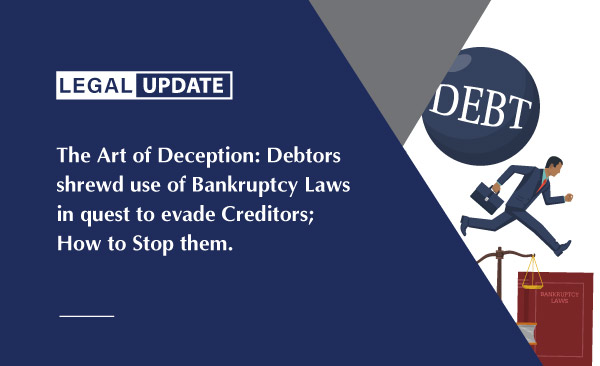 Loading...
Loading...
The Insolvency Act No. 18 of 2015 [Hereinafter ‘the Act’] revolutionized the country’s laws on bankruptcy. The key objectives of laws being:
- To secure an equitable distribution of the debtor’s property amongst creditors; and
- To relieve the debtor of his liabilities.
Application by a debtor for a Bankruptcy order
Under Section 32 of the Act, a debtor can apply for a Bankruptcy order on account of his inability to pay debts. Such an application ought to be accompanied by the debtor’s financial position indicating the nature of assets and liabilities. A key requirement being to notify Creditors of the application through publication in a paper of nationwide circulation and in the Kenya Gazette to allow objections before its hearing.
Deceptive ways used by Debtors to defraud Creditors
Bankruptcy is regarded as an option of last resort because it has serious consequences to both debtors and creditors. It has however become an unfortunate truth that not everyone in a marketplace deals in good faith. Some debtors deliberately use the law shrewdly to evade servicing their lawful liabilities. Nowadays, debtors have mastered and perfected the art of using deceptive means to corrupt the sacrosanct bankruptcy laws. The intention being the attainment of a financial gain at the expense of creditors. The two most common practices include:
- Material non-disclosure when making the application, wherein a debtor fails to issue the requisite notices to creditors thus making sure they stay in the dark.
- Concealment of assets.
It is however well settled in law that equity shall not suffer a wrong without a remedy. The Bankruptcy Act has provided a remedy to counter the above dealings, that is, annulment!
Annulment of bankruptcy orders
The annulment of a bankruptcy order effectively cancels the original bankruptcy order. The same is aptly captured under Section 272 of the Act.
The effect of annulment is that it restores “the bankrupt” to the position he was before the order was made. Therefore, the debtor will remain liable for all former debts, and any property which vested in the trustee in bankruptcy will revert to the debtor.
The grounds for applying to annul a bankruptcy order
Section 272 of the Act provides that upon an application by either a bankrupt, Official Receiver or creditor(s), a Court may annul a bankruptcy order.
To wit, the application for annulment can be hinged on any of the following grounds, inter alia:
- The orders ought not to have been made in the first place;
- There was a procedural irregularity (for instance, where service of the bankruptcy petition was defective or incomplete, material non-disclosure)
Notably, the grant for an order of annulment is discretionary in nature and upon the same being granted, the Insolvency Register held at the Office of the Official Receiver ought to be rectified.
A classical case is Insolvency Cause No. 6 of 2018: In the matter of Ali Jillo Fallan (Insolvency Cause 6 of 2018) [2021] KEHC 8 (KLR) (Commercial and Tax) (10 September 2021) (Ruling) which was handled by the firm and decided by Justice Mativo as he then was. In the case, Gulf African Bank advanced a facility of Kshs 6,554,800.00 to Mr Jillo and whereupon default the Bank filed a debt recovery suit. Upon trial, judgment was entered in favour of the Bank. Before the delivery of the judgment, Mr Jillo filed a Bankruptcy Petition under Section 32 of the Act to defeat an ensuing court decree.
In his Statement of Affairs, he attached assets worth Kshs. 158,596.92 and liabilities worth Kshs. 8,457,883.92 including the debt owed to Gulf bank. The Bank opposed the Petition and argued that it was an attempt to evade lawful liabilities and such fell short of the legal threshold. In a Ruling delivered by Justice JM Mativo, as he then was, on 10th September 2021, he wisely observed as follows:
- The Law provides a debtor to seek relief from unmanageable debt through bankruptcy;
- Bankruptcy is as an option of last resort because it has serious consequences.
- A bankruptcy petition must be made in good faith and with full material disclosure.
- The Petition must be Gazetted in the Kenya Gazette and in the newspaper to afford creditors the opportunity to come forward to either oppose or support the Petition.
- The Debtor’s statement of financial position must attain, the three-prong test; credibility, reliability and probability.
In conclusion, the Bankruptcy Petition was found unmerited and was dismissed with costs. If Mr. Jillo had been lucky to be adjudged bankrupt unprocedurally, irregularly and out of material non-disclosure, creditors such as the Bank would still have a remedy under Section 272 by moving the Court accordingly for annulment and restoration of the debtor to his original status as though the orders had never been made.
Conclusion
A Petitioner who bespeaks a Bankruptcy order must be candid and forthright as to his state of affairs and make full and frank disclosure. Since the laws on Bankruptcy have become prone to abuse by fraudsters, it is trite to implore upon them of the import of Section 272 of the Insolvency Act 2015 and remind them of our everyday Swahili adage that Dawa ya deni ni kulipa”.
This article is provided free of charge for information purposes only; it does not constitute legal advice and should be relied on as such. No responsibility for the accuracy and/or correctness of the information and commentary as set in the article should be held without seeking specific legal advice on the subject matter. If you have any query regarding the same, please do not hesitate to contact Litigation Department at Litigation@wamaeallen.com
About the author
Caxstone specializes in civil, employment and labour disputes, constitutional law, family law and succession, and environment and land matters. He has amassed a wealth of knowledge and experience in litigation which is evident in the successes obtained for clients. He is an active member of the Employment and Labour Relations Court Bar-Bench committee.
Denis Mutugi specializes in Commercial Litigation and Alternative Dispute Resolution.
Denis graduated with a Bachelor of Laws, LLB (Hons) from The University of Nairobi in 2021 and was admitted to the Roll of Advocates of the High Court of Kenya in the year 2023.
Denis has amassed a considerable wealth of experience in conducting legal research on various complex legal matters touching on Commercial, Insurance, Employment and Insolvency law and bankruptcy.
-
George Nadiohttps://wamaeallen.com/author/george-nadio/
-
George Nadiohttps://wamaeallen.com/author/george-nadio/
-
George Nadiohttps://wamaeallen.com/author/george-nadio/













